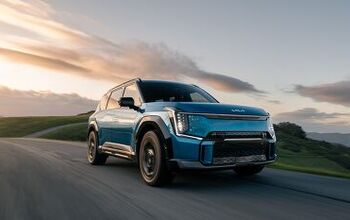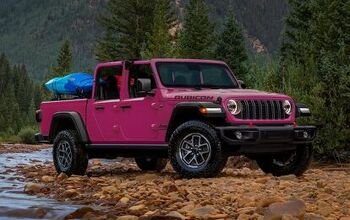General Motors Asks Government to Change Rules on EV Tax Credits

General Motors is asking the federal government to reset the federal EV tax credit system, effectively requesting a personal favor. As one of the first manufacturers to get an electric vehicle to market that people actually wanted to buy, GM hit the 200,000 cumulative EV sales cap in 2018. While customers could still get money back through April of 2020, the automaker exhausted its allotment of $7,500 subsidies before most of its rivals.
Now it wants to see the government press the reset button on the program under a pretext of fairness. GM executives are claiming that companies investing in electrification shouldn’t be handicapped by not getting additional money from taxpayers. It seems anything but fair, frankly. Though it should be said that all-electric models have a poor track record in terms of profitability. The Chevrolet Bolt certainly didn’t make any money, however, GM CEO Mary Barra has said new versions of the model will be capable of turning a profit.
Ideally, the company would like to keep you thinking about the cheaper Bolt — and not six-figure Hummer EV and $60,000 Cadillac Lyriq that are coming out within the next 12 months — as you ponder this issue.
Automakers that have exhausted their sales quota (just GM and Tesla) have already received at least $1.5 billion in subsidies from the government under the program, plus whatever else they managed to eke out during the phase-out period. The whole point of the scheme was to soften the burden of manufacturers who were transitioning to EVs and incentivize consumers to become early adopters of the technology. But now GM is allegedly on the cusp of selling Cruises that actually make money and it wants to start the whole credit system over while it’s still in the lead.
“Incentives are an important consideration at the phase that we’re in,” Steve Carlisle, president of GM North America, said during the Automotive News‘ Congress Conversations virtual event.
“Given all the potential barriers to adoption and the fact that we need to get moving along that curve, I think incentives in many different forms enter into the conversation,” he continued. “A level playing field is a reasonable thing to aspire to.”
Automakers are always going to support handouts and try will always try to con elected officials into giving them preferential treatment. It’s just what multinational corporations do. But it’s getting to the point where it is expected that any businesses clever enough to engage in some greenwashing should get piles of money. We’re sympathetic to fines and know it’s becoming increasingly difficult to build automobiles that don’t conflict with the emissions regulations of at least one country and open a manufacturer up to penalties. Unfortunately, government handouts are becoming as ridiculous as the round-robin carbon credit system that effectively just makes it easier for companies with deeper pockets to pollute. It’s getting farcical across the board and the general populace really needs to wake up and smell the nonsense.
Though it isn’t just consumers that seem oblivious. Several automotive outlets reporting on the story came out to support General Motors, with at least one appearing to suggest that EV tax credits should be extended to all automakers indefinitely.
During a recent interview with CNBC, Chief Executive Barra said that her company shouldn’t be penalized (by getting the same amount of taxpayer money as every other manufacturer) just because it was quicker at exhausting the 200,000 vehicle quota. She acknowledged that $7,500 would undoubtedly influence customers buying future EVs, noting that GM would no longer be eligible under the old Obama-era credit system.
The company has asked the Biden administration to reset them, with Tesla likely in quiet agreement — as the decision would also be a boon for its bottom line.
While we cannot say whether the White House will go for the proposal, primarily because it would make it seem as though it’s playing favorites, it is definitely interested in accelerating EV adoption. Joe Biden has introduced a $174 billion proposal tied to the gigantic infrastructure plan that would allocate over half of the funding for customer rebates and expanding the United States’ charging network. The administration has also mentioned the reintroduction of Cash for Clunkers programs that would specifically target electric cars.
[Image: Michael Urmann/Shutterstock]

A staunch consumer advocate tracking industry trends and regulation. Before joining TTAC, Matt spent a decade working for marketing and research firms based in NYC. Clients included several of the world’s largest automakers, global tire brands, and aftermarket part suppliers. Dissatisfied with the corporate world and resentful of having to wear suits everyday, he pivoted to writing about cars. Since then, that man has become an ardent supporter of the right-to-repair movement, been interviewed on the auto industry by national radio broadcasts, driven more rental cars than anyone ever should, participated in amateur rallying events, and received the requisite minimum training as sanctioned by the SCCA. Handy with a wrench, Matt grew up surrounded by Detroit auto workers and managed to get a pizza delivery job before he was legally eligible. He later found himself driving box trucks through Manhattan, guaranteeing future sympathy for actual truckers. He continues to conduct research pertaining to the automotive sector as an independent contractor and has since moved back to his native Michigan, closer to where the cars are born. A contrarian, Matt claims to prefer understeer — stating that front and all-wheel drive vehicles cater best to his driving style.
More by Matt Posky
Latest Car Reviews
Read moreLatest Product Reviews
Read moreRecent Comments
- Flashindapan I always thought these look nice. I was working at a Land Rover dealership at the time the LR3 came out and we were all impressed how much better it was then the Discovery in just about every measurable way.
- Bd2 If I were going to spend $ on a ticking time bomb, it wouldn't be for an LR4 (the least interesting of Land Rovers).
- Spectator Wild to me the US sent like $100B overseas for other peoples wars while we clammer over .1% of that money being used to promote EVs in our country.
- Spectator got a pic of that 27 inch screen? That sounds massive!
- MaintenanceCosts "And with ANY car, always budget for maintenance."The question is whether you have to budget a thousand bucks (or euro) a year, or a quarter of your income.


































Comments
Join the conversation
It's UBI for the auto industry.
Turncoat Barra can go pound salt with her 20 plus billion take home profits pushing her triple zero fantasy and profits above all else. No more bailouts and no more subsidies for GM. If her amazing wonderful "everybody in" electric cars are so wonderful subsidies shouldn't be needed.